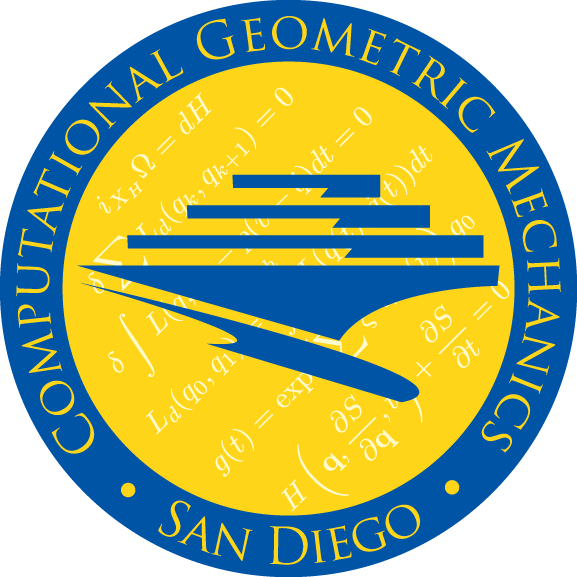

This is a research-level seminar in computational geometric mechanics throughout the 2022-2023 academic year, intended for graduate students, postdocs, and faculty interested in the field of computational geometric mechanics (a brief description of the field is provided below). The goal of this seminar is to discuss current research in computational geometric mechanics and have collaborative discussion sessions on current problems and research directions in the field.
The plan is to have a member of the Computational Geometric Mechanics group (directed by Prof. Melvin Leok) or an invited speaker moderate each session, giving a ~30 minute talk providing background on current work on a research topic in the field; subsequently, we will have a ~50 minute collaborative discussion session, where the moderator will present open problems and questions related to the topic to be discussed by the participants.
Before each session, the moderator will provide relevant materials (an abstract, papers, slides, etc.) to provide background for those interested in attending, which will be posted below and also will be sent in the mailing list.
This seminar is organized by Brian Tran. If you would like to join the mailing list for the seminar, please e-mail me at b3tran(at)ucsd(dot)edu. If you have any questions regarding the seminar, feel free to e-mail me as well.
| Date | Moderator | Title | Relevant Materials |
| May 9 | Brian Tran | Type II Hamiltonian Lie Group Variational Integrators for Geometric Adjoint Sensitivity Analysis | Abstract |
| April 25 | Dhruv Kohli | A Bottom-up Manifold Learning Framework to Embed Closed and Non-orientable Manifolds into their Intrinsic Dimension |
| Date | Moderator | Title | Relevant Materials |
| March 7 | Yousaf Habib | Control of Parasitism in Geometric Numerical Integrators | Abstract |
| February 28 | Sina Nabizadeh | Covector Fluids | Abstract |
| February 21 | Hesper Yin | Fluid Cohomology | Abstract |
| February 7 | Chad McKell | Wave Simulations in Infinite Spacetime | Abstract, Paper1, Paper2, Paper3, Paper4, Paper5 |
| January 24 | Kevin Ostrowski | A Structure-Preserving Approach to Maxwell-Vlasov Dynamics | Abstract, Paper1, Paper2, Paper3, Paper4, Paper5 |
| Date | Moderator | Title | Relevant Materials |
| November 15 | Lee Lindblom | Building Three-Dimensional Differentiable Manifolds Numerically | Abstract |
| November 8 | Khoa Tran | Lie Group Variational Collision Integrators for a Class of Hybrid Systems | Abstract and References |
| October 25 | Valentin Duruisseaux | Accelerated Optimization via Geometric Numerical Integration | Abstract and References |
| October 18 | Brian Tran | Geometric Methods for Adjoint Systems | Abstract, Slides, Paper, Related Paper on adjoint sensitivity analysis for time-dependent PDEs, Text on Numerical PDE-constrained Optimization. |
Geometric mechanics is the study and analysis of mechanical systems using geometric techniques; for example, variational and symmetry-based methods. The goal of computational geometric mechanics is to develop, analyze, and utilize methods for numerically modelling mechanical systems which preserve the geometric structure of the original continuous problem. This leads to robust methods which inherit desirable properties of the original system, such as conservation properties. This is a vast and active research field, with connections and applications to various fields in mathematics, science, and engineering, such as numerical ODE and PDE, optimal control, optimization, neural networks, and theoretical physics.
A familiarity with differential geometry and analytical mechanics would be beneficial for this seminar; a good reference is the classic text Marsden and Ratiu, Introduction to Mechanics and Symmetry. For a primer on computational geometric mechanics, see the review article Marsden and West, Discrete Mechanics and Variational Integrators and the text Hairer, Wanner, and Lubich, Geometric Numerical Integration.